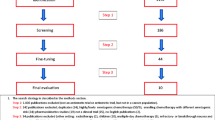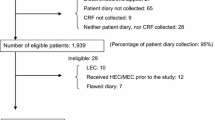Abstract
Nausea and vomiting have a negative influence on the quality of life of patients receiving chemotherapy. The Consensus Conference held in 1997 outlined the therapeutic procedure to prevent delayed emesis that might otherwise be induced by chemotherapy. So far, no study has evaluated the correct management of delayed emesis in clinical practice. This study was performed in an attempt to verify the conformity of the delayed emesis therapy administered in some oncological centres with the Consensus Conference guidelines. A total of 149 patients were observed for a minimum of one up to a maximum of four chemotherapy cycles; analysis of the data took account of whether the chemotherapy had a high (HEC), moderate (MEC) or low (LEC) emetogenic potential. Among 42 patients who received HEC, 18 (43%) received antiemetic prophylaxis conforming to standards; 23 (54.7%) of these 42 had delayed emesis, only 8 (34.7%) of whom were treated with adequate antiemetic protection. MEC was administered to 72 patients, 46 (64%) of whom received adequate prophylaxis; delayed emesis was observed in 31 (43%) of the 72 patients, 20 (64.5%) of whom received antiemetic prophylaxis according to established guidelines. Of 35 patients treated with LEC, 22.8% manifested delayed emesis; a high percentage of these patients, 68.5%, received prophylaxis, even though it was unnecessary. Of all patients observed, only 50.3% received correct antiemetic protection. We deduce from the study that antiemetic treatment for delayed emesis in clinical practice needs more attention. Correct prophylaxis is necessary when HEC is given, and antiemetic protection for patients receiving MEC must be improved; among patients treated with LEC those at high risk must be identified so that overtreatment can be avoided.
Similar content being viewed by others
References
Antiemetic Subcommitee of the Multinational Association of Supportive Care in Cancer (1998) Prevention of chemotherapy- and radiotherapy-induced emesis: results of the Perugia Consensus Conference. Ann Oncol 9:811–819
Johnston D, Latreille J, Laberge F, Stewart D, Rusthoven J, Findlay B, Ernst S, Williams CKO, Hoskins P, Yelle L, McMurtrie E, Dhaliwal H, Nishimura L, Pater J, Zee B (1995) Preventing nausea and vomiting during days 2–7 following high dose cisplatin chemotherapy (HDCP). A study by the National Cancer Institute of Canada Clinical Trials Group (NCIC CTG). Proc Am Soc Clin Oncol 14:529
Kaizer L, Warr D, Hoskins P, Latreille J, Lofters W, Yau J, Palmer M, Zee B, Levy M, Pater J (1994) Effect of the schedule and maintenance on the antiemetic efficacy of ondansetron combined with dexamethasone in acute and delayed nausea and emesis in patients receiving moderating emetogenic chemotherapy: a phase III trial by the National Cancer Institute of Canada Clinical Trials Group. J Clin Oncol 12:1050–1057
Kris MG, Gralla RJ, Clark RA, Tyson LB, O'Connel JP, Wertheim MS, Kelsen DP (1985) Incidence, cause, and severity of delayed nausea and vomiting following the administration of high-dose cisplatin. J Clin Oncol 3:1379–1384
Kris MG, Roila F, De Mulder PHM, Marty M (1998) Delayed emesis following anticancer chemotherapy. Support Care Cancer 6:228–232
Louvet C, Lorange A, Letendre F, Beaulieu R, Pretty HM, Courchesne Y, Nemeh JA, Monte M, Latreille J (1991) Acute and delayed emesis after cisplatin-based regimen: description and prevention. Oncology 48:392–396
Navari RM, Reinhardt RR, Gralla RJ, Kris MG, Hesketh PJ, Khojasteh MD, Kindler H, Grote TH, Pendergrass K, Grunberg SM, Carides AD, Gertz BJ (1999) Reduction of cisplatin-induced emesis by a selective neurokinin-1-receptor antagonist. L-754,030 Antiemetic Trials Group. N Engl J Med 340:190–195
O'Brien MER, Cullen MH, Woodroffe C, Kelly K, Burman C, Palmer K, Stuart NS, Blackledge GR, Sharpe J (1989) The role of metoclopramide in acute and delayed chemotherapy induced emesis: a randomised double blind trial. Br J Cancer 60:759–763
Roila F, Boschetti E, Tonato M, Basurto C, Bracarda S, Picciafuoco M, Patoia L, Santi E, Penza O, Ballatori E (1991) Predictive factors of delayed emesis in cisplatin-treated patients and antiemetic activity and tolerability of metoclopramide or dexamethasone. A randomized single-blind study. Am J Clin Oncol 14:238–242
The Italian Group for Antiemetic Research (1995) Dexamethasone, granisetron, or both for the prevention of nausea and vomiting during chemotherapy for cancer. N Engl J Med 332:1–5
The Italian Group for Antiemetic Research (1997) Ondansetron versus metoclopramide, both combined with dexamethasone, in the prevention of cisplatin-induced delayed emesis. J Clin Oncol 15:124–130
The Italian Group for Antiemetic Research (1997) Delayed emesis induced by moderately emetogenic chemotherapy: do we need to treat all patients? Ann Oncol 8:561–567
The Italian Group for Antiemetic Research (2000) Dexamethasone alone or in combination with ondansetron for the prevention of delayed nausea and vomiting induced by chemotherapy. N Engl J Med 342:1554–1549
Acknowledgements
The authors thank Enrico Cortesi, M.D. (University "La Sapienza", Rome), Paolo Astorre, M.D. ("Celio" Hospital, Rome), Mauro Antimi, M.D. ("S. Eugenio" Hospital, Rome) for clinical support to the study, Diana Giannarelli, M.S. (Biostatistic Unit of Regina Elena National Cancer Institute, Rome) for the assistance of statistical analysis and Mrs. Paula Frank for assistance with typing.
Author information
Authors and Affiliations
Corresponding author
Rights and permissions
About this article
Cite this article
Fabi, A., Barduagni, M., Lauro, S. et al. Is delayed chemotherapy-induced emesis well managed in oncological clinical practice?. Support Care Cancer 11, 156–161 (2003). https://doi.org/10.1007/s00520-002-0427-3
Published:
Issue Date:
DOI: https://doi.org/10.1007/s00520-002-0427-3




